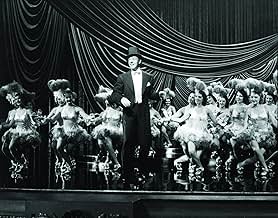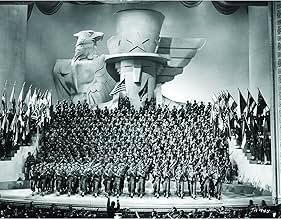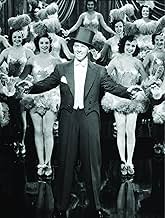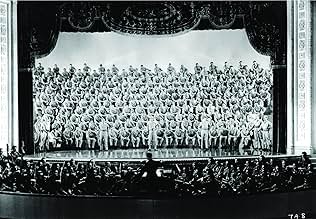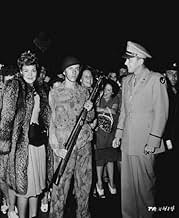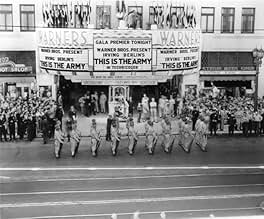VALUTAZIONE IMDb
5,8/10
1426
LA TUA VALUTAZIONE
Aggiungi una trama nella tua linguaA soldier wounded in the War (WWI) becomes a producer and stages a show for the forces.A soldier wounded in the War (WWI) becomes a producer and stages a show for the forces.A soldier wounded in the War (WWI) becomes a producer and stages a show for the forces.
- Regia
- Sceneggiatura
- Star
- Vincitore di 1 Oscar
- 3 vittorie e 2 candidature totali
Ronald Reagan
- Johnny Jones
- (as Lt. Ronald Reagan)
Alan Anderson
- Assistant Stage Manager Anderson
- (as 1st Sgt Alan Anderson)
Ezra Stone
- M
- (as M/Sgt. Ezra Stone)
- …
Recensioni in evidenza
As a twenty-year resident of Yaphank, New York, which is on Long Island about 60 miles east of Manhattan, I've learned some of the background of this movie.
Irving Berlin wrote "Yip, Yip, Yaphank" while stationed at Camp Upton in Yaphank during WW I. (Camp Upton is now the Brookhaven National Laboratory.) For this show, which was indeed written to be performed by the soldiers, Berlin wrote "Oh, How I Hate to Get Up in the Morning" and the melody of "God Bless America," which was actually cut from the show in its original form.
The show even ran briefly on Broadway in 1918 with a Camp Upton cast, according to the Internet Broadway Data Base.
After the war ended, the songs were put away, then brought out for the morale-boosting efforts of WW II. Berlin frequently rewrote and reused his songs; he revised the lyrics of "God Bless America" for Kate Smith and the rest, as they say, is history.
Irving Berlin wrote "Yip, Yip, Yaphank" while stationed at Camp Upton in Yaphank during WW I. (Camp Upton is now the Brookhaven National Laboratory.) For this show, which was indeed written to be performed by the soldiers, Berlin wrote "Oh, How I Hate to Get Up in the Morning" and the melody of "God Bless America," which was actually cut from the show in its original form.
The show even ran briefly on Broadway in 1918 with a Camp Upton cast, according to the Internet Broadway Data Base.
After the war ended, the songs were put away, then brought out for the morale-boosting efforts of WW II. Berlin frequently rewrote and reused his songs; he revised the lyrics of "God Bless America" for Kate Smith and the rest, as they say, is history.
I first saw this film on cable in the late 1970's, and was mesmerized by the story and the music. Certainly, as many people comment, it is propagandistic, but it is also a masterpiece, showcasing an almost-forgotten time. Irving Berlin is one of this country's most prolific and best-loved songwriters, and this musical extravaganza is an homage to his talent and genius.
The cast is unique and wonderful. The main characters are played solidly by "name" stars, but the musical ensemble cast (real U.S. soldiers at the time) are what set this film apart.
A reviewer complaining that it isn't "realistic" overstates the point. So what if you think an "average" army base couldn't produce a cast for a show like this. Film is a medium that attempts to suspend reality and let you enter a place, situation, relationship, time period, etc. that you might not otherwise get to experience. It's sometimes the view of one person's "reality," a manifestation of their own "vision."
My copy of this film is on a very old (early 80's) VHS copy, a low-end bargain release which is of marginal quality, but I love every minute of it. I certainly hope someone reviews some of the specific DVD choices out there, I'd like to get the DVD before I wear out the VHS!
If you enjoy a good flag-waving, patriotic musical, this is a film you will enjoy. If you enjoy Irving Berlin's music, it's a soundtrack you will enjoy. Personally I'd put this on a par with the 1942 film, "Yankee Doodle Dandy," and both films share a few cast members!
The cast is unique and wonderful. The main characters are played solidly by "name" stars, but the musical ensemble cast (real U.S. soldiers at the time) are what set this film apart.
A reviewer complaining that it isn't "realistic" overstates the point. So what if you think an "average" army base couldn't produce a cast for a show like this. Film is a medium that attempts to suspend reality and let you enter a place, situation, relationship, time period, etc. that you might not otherwise get to experience. It's sometimes the view of one person's "reality," a manifestation of their own "vision."
My copy of this film is on a very old (early 80's) VHS copy, a low-end bargain release which is of marginal quality, but I love every minute of it. I certainly hope someone reviews some of the specific DVD choices out there, I'd like to get the DVD before I wear out the VHS!
If you enjoy a good flag-waving, patriotic musical, this is a film you will enjoy. If you enjoy Irving Berlin's music, it's a soundtrack you will enjoy. Personally I'd put this on a par with the 1942 film, "Yankee Doodle Dandy," and both films share a few cast members!
This is The Army is patriotic. It is non-stop music from end to end. Ray Heindorf did an excellent job with the montages of music that are constantly heard throughout the picture. It's a treat to hear Irving Berlin sing his own song "O How I Hate To Get Up In The Morning" with its original verse and chorus.
The print I saw was duplicated from a 35mm print. One can only hope that Warners will restore this film to its original glory. It is a piece of history and its loss would be terrible.
If you plan to rent it, dont get a copy in black and white. The costumes are beautiful in color. The color prints currently available have marginal problems due to the condition of the original master print. Dont let this put you off seeing this. It's well worth the flaws.
Oh yes, there are only a handful of women in the entire production. I warned you.
The print I saw was duplicated from a 35mm print. One can only hope that Warners will restore this film to its original glory. It is a piece of history and its loss would be terrible.
If you plan to rent it, dont get a copy in black and white. The costumes are beautiful in color. The color prints currently available have marginal problems due to the condition of the original master print. Dont let this put you off seeing this. It's well worth the flaws.
Oh yes, there are only a handful of women in the entire production. I warned you.
Most of Irving Berlin's shows on Broadway were revues and not book type shows. For that reason they're not frequently revived. All of them contain topical jokes that only history majors like myself would get now. But the extreme topicality of This Is The Army and its World War I predecessor Yip Yap Yaphank guarantee you don't see this one revived too often no matter how many good songs come from it.
Even to do This Is The Army we have a threadbare plot of sorts. George Murphy is a song and dance man doing the lead in the Ziegfeld Follies when he gets his draft notice for World War I. Like Irving Berlin in real life, he offers to put his entertainment talents at the army's disposal. Murphy also marries Rosemary DeCamp at the same time he goes in the army.
Flash forward to a new World War and Murphy's son Ronald Reagan is going out with Joan Leslie who's the daughter of Charles Butterworth another performer from the Yip Yap Yaphank show back in the day. Reagan gets his draft notice just like dear old dad and he says let's put on a show for the boys. Of course dear old dad volunteers to help as do other veterans of the World War I show.
One thing that Warner's was smart about, they didn't give Ronald Reagan any singing or dancing to do. Reagan's talents such as they are were confined to behind the curtain.
A lot of Hollywood regulars are mixed with members of the original cast of actual soldiers who put on This Is The Army on Broadway. The score is also a mixed one with Irving Berlin allowing several of his older numbers mixed in with the Broadway score of This Is The Army. Most particularly God Bless America which Kate Smith had introduced in 1939 and sang in the film. It dwarfs all the other numbers in the score by comparison, in fact it's only rival in popularity in this film is Irving Berlin's soldier's lament of Oh How I Hate To Get Up In The Morning. And that originally comes from Yip Yap Yaphank. And of course that other barracks ballad telling what civilians will have to do without, the title song of the show and the film.
This Is The Army is dated flag-waving to be sure, but as Irving Berlin said in another song in another show, do you know of a better flag to wave? Both Yip Yap Yaphank and This Is The Army are the product of an immigrant kid who escaped poverty and persecution in the old world of Europe. If Irving Berlin's life isn't the American success story than I don't know a better example. He was grateful to his adopted country and these shows were his way of payback.
I doubt if B picture actor Ronald Reagan had the remotest conception that he would be sitting in the White House as a tenant one day and that he would be giving the nation's greeting to Irving Berlin on his 100th birthday. But that's an American success story too.
Even to do This Is The Army we have a threadbare plot of sorts. George Murphy is a song and dance man doing the lead in the Ziegfeld Follies when he gets his draft notice for World War I. Like Irving Berlin in real life, he offers to put his entertainment talents at the army's disposal. Murphy also marries Rosemary DeCamp at the same time he goes in the army.
Flash forward to a new World War and Murphy's son Ronald Reagan is going out with Joan Leslie who's the daughter of Charles Butterworth another performer from the Yip Yap Yaphank show back in the day. Reagan gets his draft notice just like dear old dad and he says let's put on a show for the boys. Of course dear old dad volunteers to help as do other veterans of the World War I show.
One thing that Warner's was smart about, they didn't give Ronald Reagan any singing or dancing to do. Reagan's talents such as they are were confined to behind the curtain.
A lot of Hollywood regulars are mixed with members of the original cast of actual soldiers who put on This Is The Army on Broadway. The score is also a mixed one with Irving Berlin allowing several of his older numbers mixed in with the Broadway score of This Is The Army. Most particularly God Bless America which Kate Smith had introduced in 1939 and sang in the film. It dwarfs all the other numbers in the score by comparison, in fact it's only rival in popularity in this film is Irving Berlin's soldier's lament of Oh How I Hate To Get Up In The Morning. And that originally comes from Yip Yap Yaphank. And of course that other barracks ballad telling what civilians will have to do without, the title song of the show and the film.
This Is The Army is dated flag-waving to be sure, but as Irving Berlin said in another song in another show, do you know of a better flag to wave? Both Yip Yap Yaphank and This Is The Army are the product of an immigrant kid who escaped poverty and persecution in the old world of Europe. If Irving Berlin's life isn't the American success story than I don't know a better example. He was grateful to his adopted country and these shows were his way of payback.
I doubt if B picture actor Ronald Reagan had the remotest conception that he would be sitting in the White House as a tenant one day and that he would be giving the nation's greeting to Irving Berlin on his 100th birthday. But that's an American success story too.
First of all, had you done your research, you would've known that all three branches of the military had (and still have) entertainment divisions whose sole job is to produce shows for the troops. If you looked at the "Crazy Credits" section you would've learned that famed composer Irving Berlin staged the two soldier shows as depicted in the movie.
Yes, many of the skits and songs are terribly dated and yes "This is the Army" is largely a propaganda film, but Berlin singing his "Oh How I Hate to Get Up in the Morning" was the lament of every draftee.
Virtually *every* film made during WWII was done either as propaganda or to bolster the spirits on the homefront.
I respectfully suggest watching it again, but instead of looking at it with 2004 cynicism, look at it in the context of the times.
Yes, many of the skits and songs are terribly dated and yes "This is the Army" is largely a propaganda film, but Berlin singing his "Oh How I Hate to Get Up in the Morning" was the lament of every draftee.
Virtually *every* film made during WWII was done either as propaganda or to bolster the spirits on the homefront.
I respectfully suggest watching it again, but instead of looking at it with 2004 cynicism, look at it in the context of the times.
Lo sapevi?
- QuizThe #1 moneymaker of 1943.
- BlooperThe uniform worn by Gertrude Niesen in the opening sequence is strictly of a 1943, not 1917, design, complete with padded shoulders and knee length skirt, and totally inappropriate to the 1917 era.
- Citazioni
Irving Berlin: [singing] I've been a soldier quite awhile and I would like to state, the life is simply wonderful, the Army food is great. I sleep with 97 others in a wooden hut, I love them all, they all love me, It's very lovely, but - Oh, how I hate to get up in the morning...
- Curiosità sui creditiIn the Credits, the cast members are listed in the following order: first the members, who never served in World War II, than the members of the US Armed Forces, starting with Lt. Ronald Reagan.
- Versioni alternativeOriginally shown with a pre-credits overture and exit music after the film ends, both of which have been restored on the official DVD release.
- ConnessioniFeatured in Show-Business at War (1943)
I più visti
Accedi per valutare e creare un elenco di titoli salvati per ottenere consigli personalizzati
- How long is This Is the Army?Powered by Alexa
Dettagli
- Data di uscita
- Paese di origine
- Lingua
- Celebre anche come
- La alegría del regimiento
- Luoghi delle riprese
- Azienda produttrice
- Vedi altri crediti dell’azienda su IMDbPro
Botteghino
- Lordo Stati Uniti e Canada
- 20.831.178 USD
- Tempo di esecuzione
- 2h 1min(121 min)
- Proporzioni
- 1.37 : 1
Contribuisci a questa pagina
Suggerisci una modifica o aggiungi i contenuti mancanti


